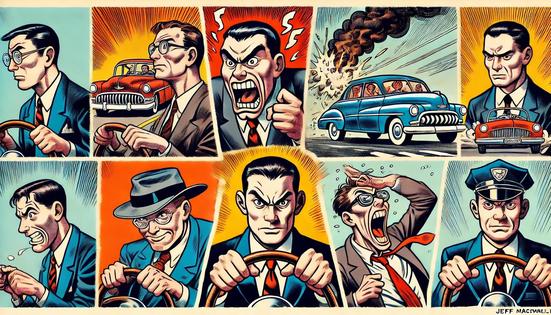The Psychology of Driving: How Your Personality Affects Your Road Behavior
Published in Automotive News
Driving is more than just a skill. It is a psychological experience shaped by personality, emotions and habits. Whether you are a cautious driver who double-checks every blind spot or an aggressive lane-splitter weaving through traffic, your behavior on the road often reflects who you are in everyday life.
The Cautious and Conscientious Driver
People who score high in conscientiousness tend to be responsible, rule-following and organized. On the road, these individuals obey speed limits, use their turn signals religiously and rarely take risks. They are often the ones slowing down before yellow lights instead of accelerating.
While their careful driving helps prevent accidents, their overly cautious nature can frustrate impatient drivers behind them. In heavy traffic, their reluctance to merge quickly or their insistence on following every rule can cause congestion, leading to tension with more aggressive drivers.
The Aggressive and Dominant Driver
Drivers who are more competitive and assertive often see the road as a battlefield. They are more likely to engage in tailgating, speeding and frequent lane changes. Studies have shown that individuals with high levels of aggression are more prone to road rage incidents and risky driving behaviors.
These drivers may feel a sense of entitlement on the road, expecting others to move out of their way. Their impatience can lead to dangerous situations, such as cutting off slower vehicles or running red lights. While their confidence allows them to react quickly in high-pressure situations, it also increases their likelihood of accidents.
The Anxious and Nervous Driver
Some drivers experience high levels of anxiety behind the wheel. They may hesitate at intersections, drive significantly under the speed limit or panic in stressful situations. These individuals are often overwhelmed by busy highways or aggressive drivers around them.
Anxious drivers are more likely to freeze up in unexpected situations, such as sudden lane closures or aggressive merging. Their indecision can create hazards, as other drivers may not anticipate their actions. However, they also tend to be hyper-aware of their surroundings, reducing their chances of reckless mistakes.
The Thrill-Seeking Risk-Taker
For some drivers, the road is a place for excitement and adrenaline. High sensation-seekers enjoy fast speeds, aggressive overtakes and taking risks in traffic. These drivers are often the ones who weave in and out of lanes or push the limits of their vehicle's performance.
Thrill-seekers may underestimate danger, leading to reckless decisions. Studies show that young male drivers, in particular, are more likely to engage in risk-taking behaviors. While they may have better vehicle control and quick reflexes, their overconfidence can lead to crashes.
The Distracted and Unfocused Driver
Modern technology has created a new category of driver—the distracted one. Whether texting, adjusting the radio or talking on the phone, distracted drivers divide their attention between the road and external stimuli.
Studies indicate that distracted driving is now one of the leading causes of accidents. Even a few seconds of inattention can result in a collision. While these drivers may not be aggressive or reckless, their lack of focus makes them a danger to themselves and others.
How to Improve Your Driving Habits
Understanding your driving personality can help you make better choices on the road. If you are aggressive, practicing patience and following speed limits can reduce risks. If you are anxious, exposure to different driving conditions and defensive driving courses can build confidence.
Regardless of your personality, being mindful of your habits and adjusting your behavior to the road conditions can help make driving safer for everyone.
This article was in part generated using AI tools








Comments